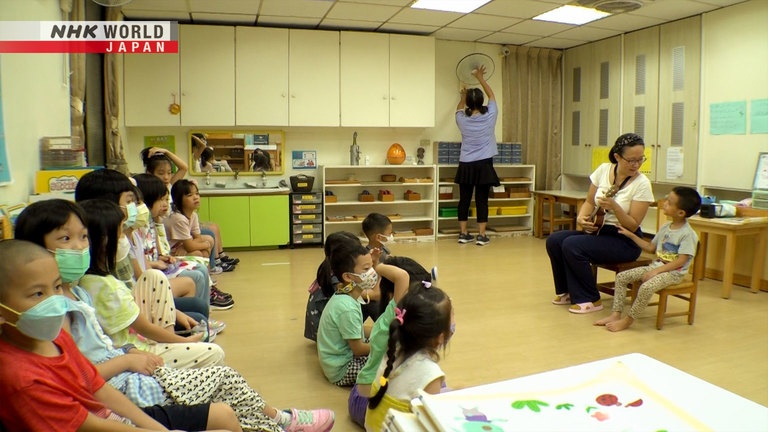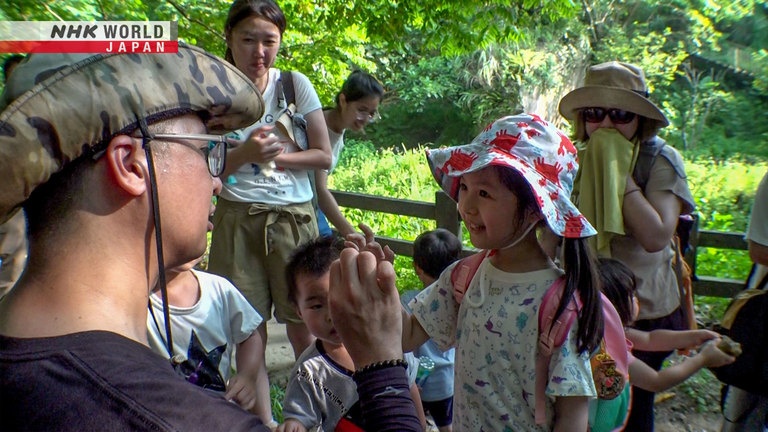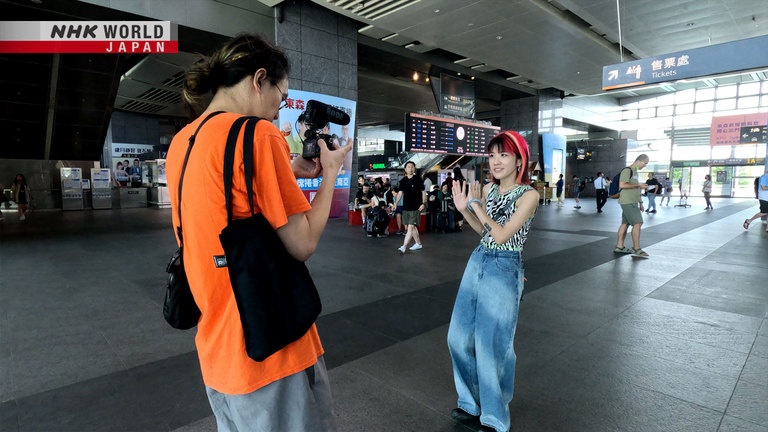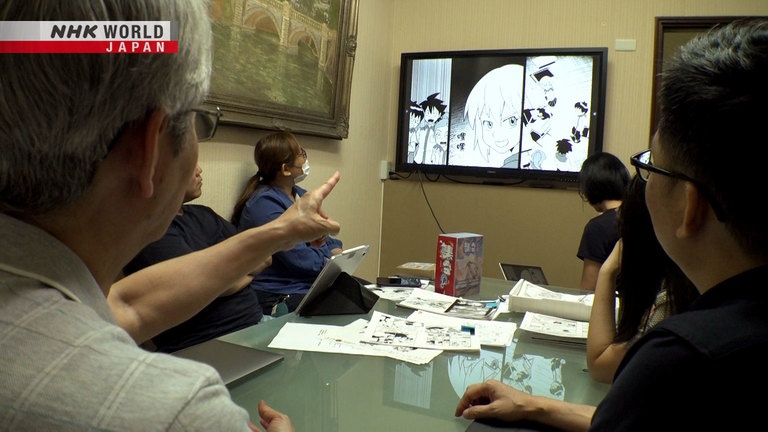A Language Identity: Taiwan
Taiwanese was the language of everyday life in Taiwan until the KMT Party under Chiang Kai-shek came to power in 1949. Then martial law was enforced, the use of Taiwanese was banned, and Mandarin Chinese became the dominant language. Today, Taiwanese is spoken and read mostly by elderly people. But as concerns grow about the loss of linguistic heritage, and against a backdrop of political tension with the mainland, young people in particular are seeking to bring back Taiwanese. A social media star, young mothers and nature guides are among the people we meet who are reexamining their identity through the medium of the Taiwanese language.




Transcript
YouTuber AYO is a hit with young Taiwanese fans.
Point the camera a little lower.
AYO chooses not to speak Taiwan's dominant language, Mandarin, but Taiwanese --
a language that can be traced to Fujian Province in southeast China.
Hey, yo! I'm AYO,
a girl from Taiwan.
I'm here on location to talk about
station announcements in Taiwanese.
Taiwanese was the language of everyday life in Taiwan
until the KMT Party under Chiang Kai-shek came to power.
Then, for nearly 40 years of martial law, the use of Taiwanese was forbidden.
Back then the KMT aggressively
suppressed the use of Taiwanese.
"Mandarin is more refined," they said.
"Your language is vulgar and useless."
In 2021, concern was voiced that -- if nothing was done
-- UNESCO would deem Taiwanese to be a language in danger.
The authorities took action.
To encourage more people to speak Taiwanese,
they positioned it alongside indigenous languages that are taught at school in Taiwan.
And these days, many young people are working hard to revitalize the Taiwanese language.
People think if we speak Mandarin
we are Chinese, a part of China.
So I decided we would speak
only Taiwanese at home.
This is our language.
We must protect it.
Speaking Taiwanese is an opportunity for the people of Taiwan to reexamine their identity.
Around 23 million people live in Taiwan.
It's home to sixteen indigenous groups,
and various populations who moved in from the Chinese mainland.
Mandarin Chinese is now the common language of Taiwan.
Because Taiwanese was once forbidden, it is now read and spoken mainly by elderly people.
In this residential neighborhood on the outskirts of Taipei,
a woman comes to teach Taiwanese at a kindergarten once a week.
Her students are aged four to five, and most of the time speak Mandarin.
The program began two years ago to expose the children to Taiwanese as early as possible.
Until recently, Tan Lek-hian was an elementary school teacher.
Her class starts with a song in Taiwanese.
Pretty eyes, pretty nose.
Pretty brows, pretty ears.
Pretty mouths eat good things.
Every day is happy, lots of smiles!
That's Taiwanese for "socks."
In Mandarin it sounds completely different -- something like "wazi."
The same is true for "gloves."
In Mandarin, the sound is something like "shou-tao."
Tan teaches the children using everyday items.
But some of them are confused by the unfamiliar language.
The regular kindergarten teachers don't speak Taiwanese.
They address the children in Mandarin.
It's okay, sit down.
Calm down.
The kids do not usually
hear Taiwanese spoken.
But they can pick it up easily.
Children just need to hear it.
A nature school conducts bug-hunting excursions in Taiwanese.
It's a popular tour for children in Taipei.
They soon catch a dragonfly.
I need a finger.
Line up, please.
The rule is that only Taiwanese is spoken on the tour.
No Mandarin.
It's sticky.
Why does it move?
Because it's alive, of course!
Chiu Chun-teng started the nature school five years ago.
He learned Taiwanese from his parents,
and has made use of his biology degree to lead over 250 tours like this one.
Today's big star is the rhinoceros beetle.
They fight over food.
They also fight to get a mate.
When I touched it,
its legs kept moving.
"It tried to get away from you
but its legs are too short."
- Why did it want to run away?
- It doesn't know who you are!
The children spend two hours enjoying nature, and learning Taiwanese.
Is this your first time?
Our 4th time.
When I was pregnant, I spoke
to my baby in Taiwanese.
But all their preschool friends
speak Mandarin.
Here, they can make friends
who speak Taiwanese.
Otherwise they'll only have friends
who speak Mandarin.
We're Taiwanese, not Chinese.
We welcome people from other places.
But this is our language.
We must protect it.
So far, the Taiwanese authorities have given financial aid
to over a hundred civilian groups that promote Taiwanese.
But the day-to-day language of Taiwan is Mandarin Chinese.
It's said that very few young people understand Taiwanese
- among teenagers, the proportion is as low as 6%.
One woman is working hard to get young Taiwanese people interested in the language.
Her name is AYO.
AYO became well known in 2019 as a reporter on a TV channel that promotes Taiwanese.
The following year, she launched a YouTube channel,
and now has around 37,000 social media followers.
This is a brain. It's always
working so it looks like this!
Her videos are filmed by her partner, who has been studying Taiwanese since he met AYO.
It's a work in progress. I've just
started studying pronunciation.
Let's study our language together.
Hi, I'm AYO, a girl from Taiwan.
Today I'll be talking about
the history of written Taiwanese.
When Europeans came to our lovely
island they met the local inhabitants.
At the time, people here
had no written language.
Everything was passed down
by word of mouth.
It was a purely oral tradition.
Many immigrants moved to Taiwan from Fujian province in mainland China
between the 17th and 19th centuries.
It's said they eventually made up 80% of the island's population,
and their language formed the base of Taiwanese.
This is the alphabet.
And Chinese characters.
We use both.
During the Qing dynasty, European
missionaries came to Taiwan.
They used the alphabet to record
the Taiwanese language.
Our written language comes
from those missionaries.
Thanks to the missionaries, Taiwanese had its first written form.
Later, Chinese characters were also used.
Any sounds that couldn't be expressed using those characters were conveyed using the alphabet.
AYO was raised by her parents to speak Taiwanese.
But at school she found herself in a Mandarin speaking environment.
I found using Mandarin a lot
influenced how I thought.
It got hard to remember
Taiwanese words. I'd make mistakes.
So I'm sharing what I myself did.
I want to show that Taiwanese
can be used for new ideas.
It's the start of a new era.
AYO made up her mind to showcase Taiwanese culture through language -- both for herself, and her generation.
And she's just getting started.
What lies behind this emerging desire to nurture an interest in Taiwanese?
Liu Ting-kang is an assistant professor in sociology at Taiwan University.
It's a response to the pressure
and influence of mainland China.
Mandarin is used in both places.
And young Taiwanese speak only that.
It's a sign of the influence
that Chinese culture has.
Language, literature, and history.
These are key building blocks
of community identity.
It is people who build communities
and shape culture.
Accordingly, the revitalization of
Taiwanese is extremely important.
Let's visit some people who encourage both parents and children to learn Taiwanese.
This group was launched with a government grant in February 2023.
Behind the project is Tan Lek-hian, the Taiwanese teacher we met earlier.
It began after an encounter with local moms at a park in 2018.
They made friends and formed a group to revive their Taiwanese skills.
They felt that to stand on equal ground with the mainland,
Taiwan needed to reexamine its own culture and language.
My parents didn't teach me Taiwanese.
I learned it because it was
all my grandparents knew.
As a parent, I feel it's my duty
to teach Taiwanese to children.
After having my own kids,
I spoke to them in Taiwanese.
The group began with just five people,
but has now grown to include over one hundred families.
We come most weeks. So many
people now see the value of Taiwanese.
I mainly spoke Mandarin, but having
kids made me think about language.
We've switched to
mainly talking in Taiwanese.
I don't speak Taiwanese very well.
Speaking with others helps me
improve and helps my kids too.
Taiwanese is being shared with a new generation by parents who were raised speaking Mandarin.
More and more parents are learning alongside their children, and shaping Taiwan's future.
YouTuber AYO was actually inspired to spread knowledge of Taiwanese by her father, Chiu Teng pang.
AYO was born and raised in the city of Tainan in southern Taiwan.
There, her father researches folk literature that has been handed down in Taiwanese.
He teaches at Cheng Kung University.
This is a special 20-day summer course for junior high school teachers.
The topic is liam kua - a very old Taiwanese form of narrative singing.
Performers would approach people.
"Would you like to hear liam kua?"
They would sing secretly at that
person's house to avoid arrest.
Only Mandarin was permitted
in crowded or public spaces.
Liam kua was heavily influenced
by language policies.
Liam kua lyrics are in Taiwanese, a language that was outlawed for nearly forty years.
How did people keep these songs alive?
Taiwanese was forbidden at school.
We could only use Mandarin.
There were fines. If you were poor,
physical punishment.
But in my case, even if I was punished,
I kept using Taiwanese.
Chiu originally worked in construction.
When he turned 40, he joined a movement to revive Taiwanese.
It inspired him to get his teaching license and study folk literature.
He's spent 25 years uncovering what was once lost.
In 1949, Taiwanese and indigenous languages were banned.
After Chiang Kai-shek's nationalists were defeated in the Chinese Civil War, they moved to Taiwan.
There, they promoted the use of Mandarin.
It became the dominant language of Taiwan,
used exclusively for all purposes including literature.
They would hang
a board around my neck.
- What kind of board?
- It said, "I must not speak Taiwanese."
We called it the dog collar.
It was painfully humiliating.
Just for speaking my language.
My generation lived through that.
The emotional scars from
those days have never healed.
So it is absolutely essential
to keep this movement going.
We have to keep Taiwanese alive.
Chiu is visiting his famous daughter, AYO.
She always asks him to check before she uploads a new video.
AYO grew up speaking Taiwanese, but she didn't study it seriously until after university.
Having a Taiwanese culture and language researcher for a father has been a great help.
"It's good for their records
and for our language."
"Records."
- I said it wrong?
- Yeah.
Another one.
- Really?
- Yeah.
- And another!
- What?!
Never mind. I'll cut this bit.
What do you think of AYO's work?
It's wonderful.
She uses her video skills
to promote Taiwanese.
Not many people are showcasing
the culture around our language.
And she's appealing to young people.
I have no idea what
young people are thinking.
So I couldn't do what she does.
What I can do is offer help behind
the scenes and check her content.
Even as a kid, I saw Dad's
commitment to his activities.
I was naturally drawn to that,
and his way of thinking.
What we do may look different,
but we share the same core ideas.
I see this as a good way
to transmit cultural heritage.
The father is passing the torch, and the daughter is keeping it burning.
A new manga series has hit the shelves with the goal of introducing younger readers
to Taiwanese history and the Taiwanese language.
First published in November 2022, new volumes have been coming out every two months.
The story focuses on five main characters
who have adventures on a fictional island that maps to Taiwan.
They meet a diverse array of people, stand against evil,
help each other, and expand their group of friends.
Over fifty people are involved in making the manga.
They hope to publish 120 volumes for the series - an ambitious undertaking.
It's the brainchild of Chen Li-po, who spent many years outside Taiwan working in the food industry.
On his return, he was shocked to find his grandchildren couldn't speak Taiwanese,
and that inspired him to launch the project.
The characters' journeys are designed to make readers curious about Taiwan's history.
The stories also tackle modern Taiwanese issues, so the manga appeals to young readers.
I speak Taiwanese, but can't read it.
Same here. I can't read it.
There's a major obstacle to making Taiwanese more familiar.
Most manga-readers are of a generation that can't read Taiwanese.
So the manga is written in Mandarin,
and the team makes videos where the lines are spoken in Taiwanese.
The voice work is done in Tainan,
where the everyday use of Taiwanese is more common than in other regions.
The top priority is to make the sounds of Taiwanese familiar.
Over time, the plan is to switch the manga's text as well.
I first read up on the issue when
I heard Taiwanese might be in danger.
Taiwanese is dying out because folks
don't speak it to their grandkids.
Folks my age.
I'm 70 and I have a 20-year plan.
It might sound like I shouldn't
be thinking that far ahead!
But our team is in their 20s and 30s.
I believe they can keep going
for 20, even 30 years or more.
I'm getting them off to a good start.
That's my responsibility.
Then they can take it from there.
Reexamining Taiwan's identity through the Taiwanese language.
It's a movement that is gradually catching on among the younger generation.
- Can you read that?
- "I make mochi cakes."
- And the penguin?
- "The penguin is asleep."